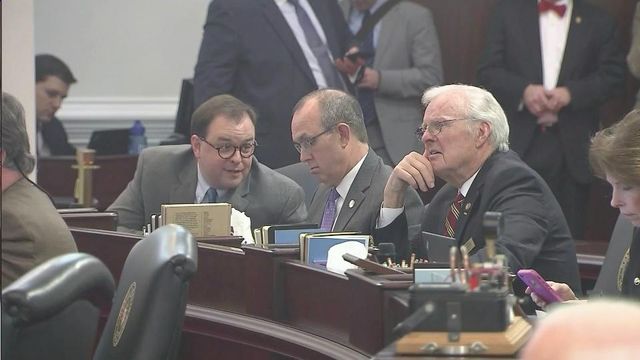Lawmakers move to change congressional primary date, eliminate runoff elections
The state House has approved a bill that would move the state's congressional elections to June 7 and eliminate second primaries. The two moves are being made in response to a court-ordered redrawing of North Carolina's 13 congressional districts.
Posted — UpdatedAt the same time the maps were redrawn, House members worked out the timing for the new congressional elections.
That bill passed the state House shortly before 8 p.m. on a 71-32 vote. Senators are due to take up the bill Friday, when the House reviews the map.
The elections date measure calls for a June 7 election, unless the U.S. Supreme Court steps in to stay the lower court order that demanded the new maps.
So until March 15, candidates running under the maps drawn in 2011 will have to keep running. If no stay is forthcoming, those results will be thrown out, and a new filing period for those who want to run for Congress under the new maps will open on March 16 and run though March 25.
That means candidates planning to run in the June 7 primary will have to begin maneuvering for that election even as those running in the March 15 primary keep stumping for votes.
When asked about this, House Redistricting Committee Chairman David Lewis, R-Harnett, acknowledged that it creates a confusing set of circumstances.
"I think the gentlemen points out that confusion and uncertainty that, in the opinion of this chair, this court order has caused," Lewis said.
Second primaries eliminated
The bill also eliminates runoff primaries for 2016.
Under current law, candidates running for office need to get at least 40 percent of the votes cast in order to avoid a second primary. If the leading candidate in a race falls under that threshold, the second place finisher can call for a runoff.
Lawmakers eliminated those runoff elections for 2016, pointing out the timing crunch created by having to hold a second congressional election.
That could have a major impact in elections with more than three candidates and no prohibitive front-runner.
For example, in the Democratic primary for U.S. Senate, former Rep. Deborah Ross, D-Wake, is running against three challengers. She is the best funded and probably best known candidate. However, if she failed to reach 40 percent under the current election rules, a challenger such as Spring Lake Mayor Chris Rey or Durham businessman Kevin Griffin would have a chance to corral more support in a second primary.
Republican 2nd District Congresswoman Renee Ellmers has up until now faced three challengers in her primary. Each of those is arguing that he or she is a more conservative option. With no second primary, a second-place finisher would not have the chance to consolidate support form the party's conservative wing.
Of course, if the Supreme Court does step in, that new political reality is thrown out. A stay by the Supreme Court would activate a clause in the bill making all votes cast on March 15, including the ones for Congress, count and bringing back the second primary for all those races.
Running and running again
The bill also creates the possibility that one politician could find himself or herself running for two offices at once.
That's because someone running for legislature or another office, such as county commissioner, could win that primary and then file to run for the June 7 congressional primary. If the candidate wins the congressional primary as well, that person would have a choice to make.
"You would have to withdraw from one of those two offices," said Rep. Bert Jones, R-Rockingham, the lead author of the election bill.
Candidates would be given about a week to decide which race they wanted to run in.
Rep. Darren Jackson, D-Wake, proposed moving all of the state's primary elections back until June 21, including those running for Congress, president and a $2 billion bond referendum.
Jones objected, saying that such a move would "create chaos" for those running for a host of offices up and down the ballot.
Rep. Grier Martin, D-Wake, backed Jackson, saying the amendment would simplify matters for voters.
"It will reduce the likelihood of chaos not only for the candidates but for the North Carolinians they seek to serve," Martin said.
Members of the House rejected the amendment.
Happy to see it
Rep. Elmer Floyd, D-Cumberland, celebrated the elimination of the second primaries, even if it is only temporary. He has long argued that second primaries are costly and a vestige of days when second primaries were used as tools to keep black candidates out of office.
"I'm happy to just see it tried this year," Floyd said.
Jones said that the reason they were eliminated this year had to do with timing. He said the State Board of Elections could not juggle holding a second primary for all other elections while getting ready for the congressional primary.
Barring future complications, he said, the state would once again have second primaries in 2018.
Related Topics
• Credits
Copyright 2024 by Capitol Broadcasting Company. All rights reserved. This material may not be published, broadcast, rewritten or redistributed.






